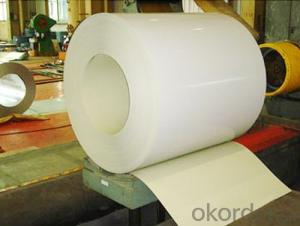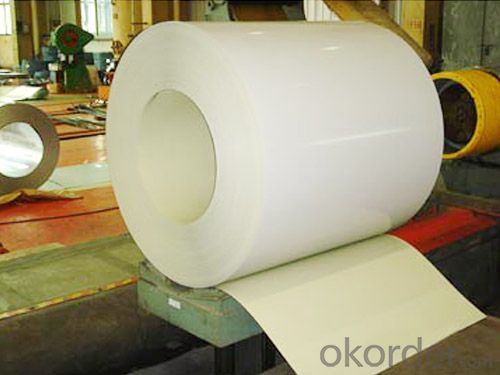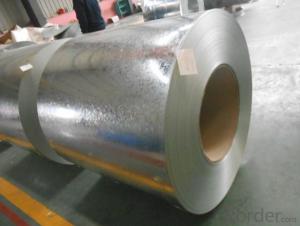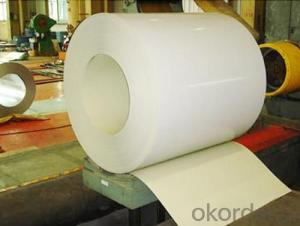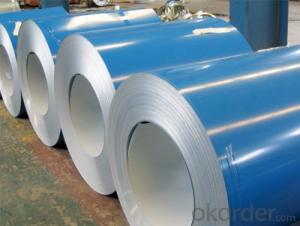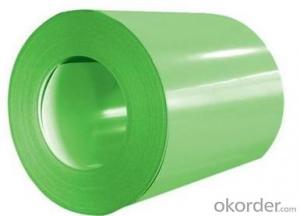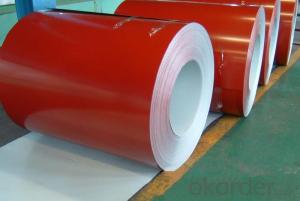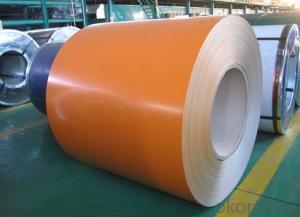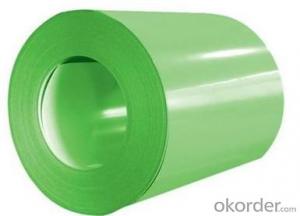Pre-painted Galvanized / Aluzinc Steel Sheet Coil with Prime Quality and Lowest Price
- Loading Port:
- Shanghai
- Payment Terms:
- TT OR LC
- Min Order Qty:
- 100 m.t.
- Supply Capability:
- 10000 m.t./month
OKorder Service Pledge
OKorder Financial Service
You Might Also Like
1.Structure of Pre-painted Galvanized/Aluzinc Steel Coil Description
With GI (aluzinc) as base metal, after pretreatment (degrease and chemical treatment) and liquid dope with several layers of color, then after firing and cooling, finally the plate steel is called pre-painted galvanized (aluzinc) steel. Pre-painted galvanized steel is good capable of decoration, molding, corrosion resistance. It generally displays workability, durability and weather resistance.
2.Main Features of the Pre-painted Galvanized/Aluzinc Steel Coil
• Excellent corrosion resistance
• Excellent weather resistance
• Capability of decoration, molding, corrosion resistance
• Workability, durability
• Excellent heat resistance performance
• High strength
• Good formability
• Good visual effect
3.Pre-painted Galvanized/Aluzinc Steel Coil Images
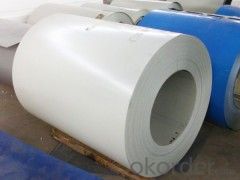
4.Pre-painted Galvanized/Aluzinc Steel Coil Specification
Quality standar: JIS G3312 CGCC & CGLCC
Hardness of P: Both soft and hard quality are available
Surface finish: with or without protect film
Thickness : 0.14-1.20 mm
Width : 914mm, 1000mm, 1220mm and 1250mm, thickness 600-1250mm is available
Finish by coil or sheet: Both sheet and coil are available
8Zinc coating: 60-275G/M2, both sides
Paint thickness for top side : 5 micron primer + (10-20) microns modified polyester, any RAL color code.
Paint thickness for back side: (5-10) microns Epoxy
Weight per coil: 4-6 tons, also can be upon customer's requirements
Max loading weight in one 20ft container : 25 tons generally
5. FAQ of Pre-painted Galvanized/Aluzinc Steel Coil
We have organized several common questions for our clients,may help you sincerely:
1. What is the minimum order quantity ?
Our MOQ is 50mt for each size. And we will consider to give more discount if you make big order like 1000 tons and more. Further more, the more appropriate payment term your offer the better price we can provide.
2. How long can we receive the product after purchase?
Usually within thirty working days after receiving buyer’s advance payment or LC. We will arrange the factory manufacturing as soon as possible. The cargo readiness usually takes 15-25 days, but the shipment will depend on the vessel situation.
3. How to guarantee the quality of the products?
We have established the international advanced quality management system,every link from raw material to final product we have strict quality test;We resolutely put an end to unqualified products flowing into the market. At the same time, we will provide necessary follow-up service assurance.
- Q: How is steel sustainable as a building material?How is wood sustainable as a building material?
- The choice is yours to make so just click on the proper button for the specific project and then they are right there for you to pick one. The diagrams and instructions will be right there in the computer for you to access at any time or if you prefer you can print them out.
- Q: The highest quality i have seen is 9260 and i want to know if there is a higher quality steel.
- Types of steel are one issue. But the quality of steel no matter what type is even more important. The only way to be sure that you are getting a good blade is to buy from someone that already has a reputation for producing great blades. Stop the questions about who thinks what type of steel is best and investigate the steel blades offered by companies like Bugei Trading company. they have good blades. Opinions vary, but Bugei has proven that they make good swords. That is all that is needed to be known. Any questions you have are best directed to them, not here.
- Q: I want to start getting throwing knives and i was wondering what material is best for quality, but still cheap. I also saw some 440 stainless steel knives that i liked and wanted to know if the material was good
- Stainless Steel Throwing Knives
- Q: How are steel coils inspected for damage during transportation?
- Steel coils are typically inspected for damage during transportation through visual inspections and non-destructive testing methods such as ultrasonic testing, magnetic particle inspection, and eddy current testing. These inspections help identify any cracks, dents, or other forms of damage that may have occurred during transportation.
- Q: What is the thickness of a steel coil?
- The thickness of a steel coil can vary depending on the specific application and requirements. However, it typically ranges from a few millimeters to several centimeters.
- Q: What are the dimensions of steel coils used in automotive accessory manufacturing?
- The dimensions of steel coils used in automotive accessory manufacturing can vary depending on the specific application and requirements. However, typical dimensions for steel coils used in this industry range from 0.3 mm to 4.0 mm in thickness and from 600 mm to 2000 mm in width. The length of the coil can also vary, but it is commonly around 2000 meters.
- Q: What are the pros and cons to selecting a graphite shaft sand wedge over steel shaft?
- The way to resolve the selection is to go with the shaft that matches the other clubs in your set. If you have steel shafted irons go with steel. You will find the similar feel when you hit shots is most important.
- Q: This needs to be in a percentage by mass. Could you please also reference where this info has come from. Thanks.
- pl. be specific about the type of steel: (Steel is a metal alloy whose major component is iron, with carbon content between 0.02% and 1.7% by weight. Carbon is the most cost effective alloying material for iron, but many other alloying elements are also used.[1] Carbon and other elements act as a hardening agent, preventing dislocations in the iron atom crystal lattice from sliding past one another. Varying the amount of alloying elements and their distribution in the steel controls qualities such as the hardness, elasticity, ductility, and tensile strength of the resulting steel. Steel with increased carbon content can be made harder and stronger than iron, but is also more brittle. The maximum solubility of carbon in iron is 1.7% by weight, occurring at 1130° Celsius; higher concentrations of carbon or lower temperatures will produce cementite which will reduce the material's strength. Alloys with higher carbon content than this are known as cast iron because of their lower melting point.[1] Steel is also to be distinguished from wrought iron with little or no carbon, usually less than 0.035%. It is common today to talk about 'the iron and steel industry' as if it were a single thing; it is today, but historically they were separate products. Currently there are several classes of steels in which carbon is replaced with other alloying materials, and carbon, if present, is undesired. A more recent definition is that steels are iron-based alloys that can be plastically formed (pounded, rolled, etc.). Iron alloy phases : Austenite (γ-iron; hard) Bainite Martensite Cementite (iron carbide; Fe3C) Ferrite (α-iron; soft) Pearlite (88% ferrite, 12% cementite) Types of Steel : Plain-carbon steel (up to 2.1% carbon) Stainless steel (alloy with chromium) HSLA steel (high strength low alloy) Tool steel (very hard; heat-treated) Other Iron-based materials : Cast iron (2.1% carbon) Wrought iron (almost no carbon) Ductile iron)
- Q: What are the common coil weight and width combinations available for steel coils?
- The common coil weight and width combinations available for steel coils vary depending on the specific industry and application. However, some commonly available coil weight and width combinations for steel coils include weights ranging from 1 to 40 metric tons and widths ranging from 600 to 2,000 millimeters. These combinations can be tailored to meet the requirements of different manufacturing processes and end-user needs.
- Q: What are the common processing defects in steel coils?
- The common processing defects in steel coils include surface imperfections such as scratches, dents, and stains, as well as edge wave, coil set, camber, and crossbow. Other defects may include coil breaks, oil spots, rust, and uneven thickness or width variation.
Send your message to us
Pre-painted Galvanized / Aluzinc Steel Sheet Coil with Prime Quality and Lowest Price
- Loading Port:
- Shanghai
- Payment Terms:
- TT OR LC
- Min Order Qty:
- 100 m.t.
- Supply Capability:
- 10000 m.t./month
OKorder Service Pledge
OKorder Financial Service
Similar products
Hot products
Hot Searches
Related keywords
